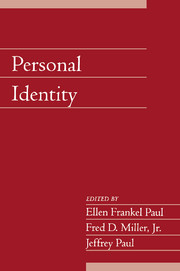Book contents
- Frontmatter
- Contents
- Introduction
- Acknowledgments
- Contributors
- Experience, Agency, and Personal Identity
- When Does a Person Begin?
- Persons, Social Agency, and Constitution
- Hylemorphic Dualism
- Personal Identity and Self-Ownership
- Self-Conception and Personal Identity: Revisiting Parfit and Lewis with an Eye on the Grip of the Unity Reaction
- The Normativity of Self-Grounded Reason
- Rationality Means Being Willing to Say You're Sorry
- Personal Identity and Postmortem Survival
- “The Thing I Am”: Personal Identity in Aquinas and Shakespeare
- Moral Status and Personal Identity: Clones, Embryos, and Future Generations
- The Identity of Identity: Moral and Legal Aspects of Technological Self-Transformation
- Index
Persons, Social Agency, and Constitution
Published online by Cambridge University Press: 05 July 2014
- Frontmatter
- Contents
- Introduction
- Acknowledgments
- Contributors
- Experience, Agency, and Personal Identity
- When Does a Person Begin?
- Persons, Social Agency, and Constitution
- Hylemorphic Dualism
- Personal Identity and Self-Ownership
- Self-Conception and Personal Identity: Revisiting Parfit and Lewis with an Eye on the Grip of the Unity Reaction
- The Normativity of Self-Grounded Reason
- Rationality Means Being Willing to Say You're Sorry
- Personal Identity and Postmortem Survival
- “The Thing I Am”: Personal Identity in Aquinas and Shakespeare
- Moral Status and Personal Identity: Clones, Embryos, and Future Generations
- The Identity of Identity: Moral and Legal Aspects of Technological Self-Transformation
- Index
Summary
I. Introduction
In her recent book Persons and Bodies (hereafter PB), Lynne Rudder Baker has defended what she calls the constitution view of persons. On this view, persons are constituted by their bodies, where “constitution” is a ubiquitous, general metaphysical relation distinct from more familiar relations, such as identity and part-whole composition.
The constitution view answers the question “What are we?” in that it identifies something fundamental about the kind of creature we are. For Baker, we are fundamentally persons. Persons are not capable simply of having mental states, nor merely of having a first-person perspective, a subjective point of view. Rather, persons are creatures that can conceive of themselves as having (or, presumably, lacking) a perspective: they have an awareness of themselves as beings with a first-person perspective. This is what, extending Baker's terminology, we might call having a strong first-person perspective, and it is this capacity that demarcates persons from other kinds of things in the world (PB, 64). Persons thus stand in contrast with most if not all nonhuman animals, and our status as persons entails that we are not merely animals. Thus, the constitution view contrasts both with more standard psychological views of what is special about human beings (views that have their historical home in Cartesian dualism and in John Locke's discussion of personal identity in An Essay Concerning Human Understanding), as well as with animalist views, which hold that we are, fundamentally, animals.
- Type
- Chapter
- Information
- Personal Identity , pp. 49 - 69Publisher: Cambridge University PressPrint publication year: 2005

